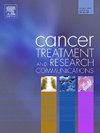A protocol for pre-treatment testing for antibodies to galactose-alpha-1,3-galactose to mitigate the risk of cetuximab hypersensitivity reactions – a retrospective cohort review
IF 2.4
Q3 Medicine
引用次数: 0
Abstract
Purpose
Cetuximab improves survival in KRAS wildtype metastatic colorectal cancer. However, high rates of hypersensitivity reactions (HSRs) limit its use, with HSR rates up to 10–20 %. A major driver of cetuximab HSR is from pre-formed IgE antibody response to galactose-1,3-alpha-galactose (alpha-gal). Evidence from retrospective studies supports alpha-gal pre-screening in this setting. This study reports the impact of prospective alpha-gal antibody screening on cetuximab HSR.
Patients and Methods
Records were reviewed across three medical oncology centres that have adopted alpha-gal antibody screening measures. Data for patients with metastatic colorectal cancer treated with cetuximab were retrieved. All centres assessed alpha-gal levels using the ImmunoCAP® immunoassay. Due to variability in alpha-gal screening practices across study sites, a standardised protocol was applied to all cases. This protocol allowed cetuximab administration if alpha-gal levels were ≤0.10 kUA/L, but prohibited it if alpha-gal levels were >0.10 kUA/L in favour of panitumumab administration. Patients were allocated to either the Alpha-gal Pre-screening Applied (‘Pre-screening’) or Alpha-gal Pre-screening Not Applied (‘Reference’) cohorts based on protocol requirements being met. The primary outcome between these patient groups was the incidence of cetuximab HSRs.
Results
Of 254 assessable patients, 39 underwent the pre-treatment screening protocol. Of the Pre-screening group, 3% (n=1/39) experienced a cetuximab HSR compared to 16% (n=35/215) in the Reference group (Odds ratio (OR) 0.14; 95% CI 0.0033–0.86, p = 0.02). Patients with alpha-gal antibody titres >0.10 kUA/L were more likely to experience a cetuximab HSR (OR 69.71; 95% CI 5.18–4296.81, p=0.0001).
Conclusion
Pre-treatment screening for alpha-gal antibodies significantly reduces the incidence of cetuximab HSRs. A testing threshold of 0.10 kUA/L is effective in identifying patients at risk. Implementing this protocol can improve the safety of cetuximab therapy in high-risk populations.
Micro Abstract
Hypersensitivity reactions (HSRs) limit cetuximab use in KRAS wildtype advanced colorectal cancer, with a significant driver being pre-formed IgE antibodies against galactose-1,3-alpha-galactose (alpha-gal). Our multicentric retrospective study assessed the impact of prospective alpha-gal antibody screening on HSR incidence following cetuximab administration. Of 254 assessable patients, pre-treatment alpha-gal antibody screening significantly reduced the incidence of cetuximab HSRs (3% vs 16%; OR 0.14, p=0.02). Our findings support pre-treatment alpha-gal screening to improve safety of cetuximab therapy in high-risk populations.
半乳糖- α -1,3-半乳糖抗体的治疗前检测方案,以减轻西妥昔单抗过敏反应的风险-一项回顾性队列回顾
目的:塞妥昔单抗提高KRAS野生型转移性结直肠癌患者的生存率。然而,高过敏反应率(HSRs)限制了其使用,高过敏反应率高达10 - 20%。西妥昔单抗HSR的主要驱动因素是预先形成的IgE抗体对半乳糖-1,3- α -半乳糖(α -gal)的反应。来自回顾性研究的证据支持在这种情况下进行α -gal预筛查。本研究报告了前瞻性α -半乳糖抗体筛选对西妥昔单抗HSR的影响。研究人员回顾了三个采用α -半乳糖抗体筛查措施的肿瘤医学中心的患者和方法。收集了西妥昔单抗治疗的转移性结直肠癌患者的数据。所有中心使用ImmunoCAP®免疫分析法评估α -gal水平。由于各研究地点α -gal筛查实践的可变性,对所有病例采用标准化方案。如果α -gal水平≤0.10 kUA/L,该方案允许西妥昔单抗给药,但如果α -gal水平为>;0.10 kUA/L,则禁止西妥昔单抗给药,有利于帕尼单抗给药。根据方案要求,将患者分配到应用α -gal预筛查(“预筛查”)或未应用α -gal预筛查(“参考”)队列。这些患者组之间的主要结局是西妥昔单抗HSRs的发生率。结果在254例可评估患者中,39例接受了治疗前筛查方案。在预筛查组中,3% (n=1/39)的患者出现了西妥昔单抗HSR,而在参比组中,这一比例为16% (n=35/215)(优势比(OR) 0.14;95% CI 0.0033-0.86, p = 0.02)。α -半胱氨酸抗体滴度>;0.10 kUA/L的患者更容易发生西妥昔单抗HSR (OR 69.71;95% CI 5.18-4296.81, p=0.0001)。结论治疗前筛选α -gal抗体可显著降低西妥昔单抗HSRs的发生率。0.10 kUA/L的检测阈值对于识别有风险的患者是有效的。实施该方案可以提高高危人群西妥昔单抗治疗的安全性。超敏反应(HSRs)限制了西妥昔单抗在KRAS野生型晚期结直肠癌中的应用,其中一个重要的驱动因素是预先形成的针对半乳糖-1,3- α -半乳糖(α -gal)的IgE抗体。我们的多中心回顾性研究评估了前瞻性α -半胱氨酸抗体筛查对西妥昔单抗治疗后HSR发病率的影响。在254名可评估的患者中,治疗前α -半胱氨酸抗体筛查显著降低了西妥昔单抗HSRs的发生率(3% vs 16%;OR 0.14, p=0.02)。我们的研究结果支持治疗前alpha-gal筛查以提高高危人群西妥昔单抗治疗的安全性。
本文章由计算机程序翻译,如有差异,请以英文原文为准。
求助全文
约1分钟内获得全文
求助全文
来源期刊

Cancer treatment and research communications
Medicine-Oncology
CiteScore
4.30
自引率
0.00%
发文量
148
审稿时长
56 days
期刊介绍:
Cancer Treatment and Research Communications is an international peer-reviewed publication dedicated to providing comprehensive basic, translational, and clinical oncology research. The journal is devoted to articles on detection, diagnosis, prevention, policy, and treatment of cancer and provides a global forum for the nurturing and development of future generations of oncology scientists. Cancer Treatment and Research Communications publishes comprehensive reviews and original studies describing various aspects of basic through clinical research of all tumor types. The journal also accepts clinical studies in oncology, with an emphasis on prospective early phase clinical trials. Specific areas of interest include basic, translational, and clinical research and mechanistic approaches; cancer biology; molecular carcinogenesis; genetics and genomics; stem cell and developmental biology; immunology; molecular and cellular oncology; systems biology; drug sensitivity and resistance; gene and antisense therapy; pathology, markers, and prognostic indicators; chemoprevention strategies; multimodality therapy; cancer policy; and integration of various approaches. Our mission is to be the premier source of relevant information through promoting excellence in research and facilitating the timely translation of that science to health care and clinical practice.
 求助内容:
求助内容: 应助结果提醒方式:
应助结果提醒方式:


